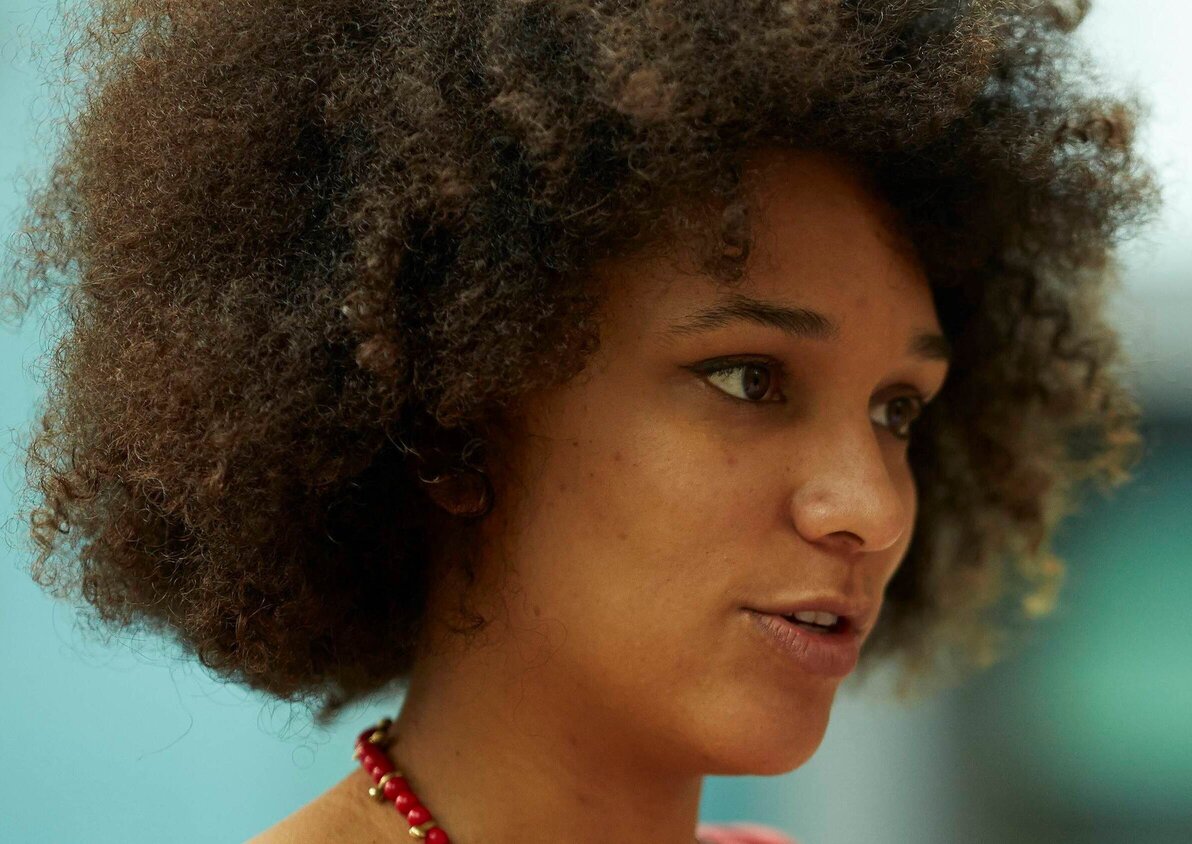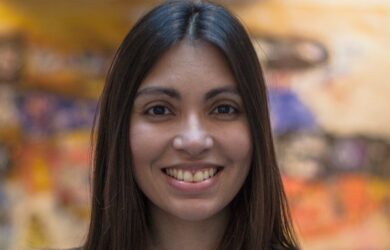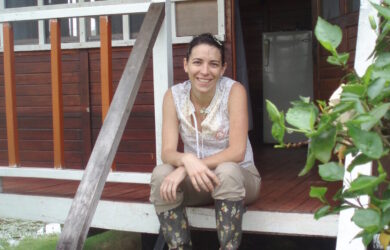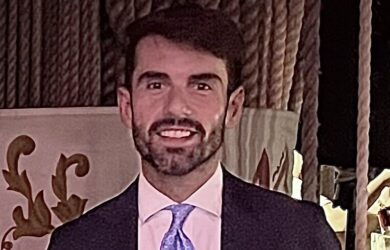
Johanna Riha talks about her career in epidemiology and policy and her new role at the UN University International Institute for Global Health.
I’ve been extremely lucky and in many ways very privileged along my path, and Cambridge has definitely been a landmark in my life.
Johanna Riha
The middle of a global pandemic may not seem the ideal time to move country with a new baby, but Johanna Riha [2011] took up her new role as a research fellow at the United Nations University International Institute for Global Health (UNU-IIGH) in Malaysia during the pandemic and moved to Kuala Lumpur around a month ago.
Her job involves evaluating, consolidating and synthesising evidence of what works when it comes to addressing gender and intersectional inequalities in health programmes globally, with a special focus on the global South. Johanna works within the Gender and Health Hub (GHH) at UNU-IIGH, and says she has been thrilled to join a “fantastic, extremely international, woman-led team” working with member states, civil society organisations and the UN agencies. The GHH is funded by the Gates Foundation.
For Johanna, who has two young children, it brings together her personal connection and interest in the global South, her international outlook and her expertise in public health which was further developed during her time at Cambridge where she worked on non-communicable diseases in rural Uganda.
A global citizen
Johanna has always been a global citizen. Born in Holland, she only spent a few weeks there before moving to Sierra Leone where her parents were living at the time. Her mother is Tanzanian and her father Austrian. Due to her father’s job as a medical engineer, she lived in Sierra Leone for her first six years and then in Kenya and Cote d’Ivoire, studying at international schools each time. Johanna says growing up in so many different countries – and visiting many others in West Africa – has made her who she is today.
At school, Johanna was very studious – she describes herself as “a goody two shoes” – and swam competitively for the national team in Cote d’Ivoire. In December 2002, at the beginning of the civil war, with six months left before she graduated, Johanna left the country with her family and completed her high-school certification at a boarding school in England which one of her best friends was also attending.
Biology
Johanna originally applied to do International Relations and Development Studies at university, but after taking an advanced placement course in Biology during her last year in high school with an exceptional teacher, she switched to Biology. Johanna did her undergraduate degree in Biology at the University of Birmingham. Arriving in Birmingham alone at 17, she remembers feeling very daunted but soon bonded closely with students from Singapore, Turks and Caicos, India and Nigeria.
Her three-year undergraduate degree involved an element of field research – on air-breathing fish in Brazil. Thereafter she was offered a fully-funded PhD at Birmingham studying circadian rhythms in birds, but her father’s job had given her an interest in public health. So instead, she searched for alternative master’s programmes in public health and came across the course in epidemiology at the London School of Hygiene and Tropical Medicine (LSHTM). At that stage, she had never heard of epidemiology before, but said the course appealed to her because it provided a clear route to a job where she could make a difference – using the skills to understand the underlying causes of disease in populations with a view to coming up with viable solutions. She describes her master’s as an “incredible, intense, but truly rewarding experience,” again bonding with a very international group of people. .
Epidemiology
When it ended, Johanna was keen to get some work experience. She applied for several junior roles at the Health Protection Agency [now Public Health England], but was unsuccessful. However, she was encouraged to apply for a more senior position within the UK National Chlamydia Screening Programme leading the information management workstream. Surrounded by supportive managers, the role gave her an insight into national public health surveillance programmes and health policy. Johanna spent three years working there before moving on to Cambridge where she joined a genetic epidemiology research team.
Although she was not a genetic epidemiologist herself, the team had begun working on several projects focusing on non-communicable diseases in Africa, a growing problem which Johanna was passionate about, but which had received relatively little attention. Johanna jumped at the opportunity and began working on epidemiological studies in South Africa and Uganda as a research assistant and subsequently applied for a PhD.
In her first year as a Gates Cambridge Scholar she was still working in the same team on the outskirts of Cambridge and didn’t mix much with the Gates Cambridge community. All that changed in her second year, though.
Cambridge
During her time at Cambridge Johanna also became the first president of the African Society of Cambridge University. In addition, she was a driving force behind the Africa Together conference, which brought together people from the arts, media, business and science to talk about developments and ideas on the continent, celebrating pan-Africanism through the commemoration of the formation of the African Union. The event has since become an annual event at Cambridge. “It was a humbling experience to see it happen and made my time at Cambridge richer,” she says. “I am so glad that it is growing from strength to strength and continues to bring African students together.”
Johanna says Gates Cambridge was very supportive of her activities, giving her extra time for her PhD which focused on risk factors for hypertension in communities in a rural district in central Uganda. Her work focused on investigating the impact of urbanisation and accompanying lifestyle changes linked to risk factors for hypertension. “Even in places where there were no paved roads you could see changes in people’s behaviour, less exercise and less fruit and vegetables in people’s diets,” she says. “So much of non-communicable disease work focuses on urban environments, but we are seeing things changing in rural areas where most of Uganda’s population lives and it is having a huge impact. It is vital that we think about and prioritise prevention.”
Johanna worked with rural communities to find local solutions. She did the preliminary work to inform the design of a randomised control trial assessing whether salt substitutes could reduce high blood pressure. As part of this work she combined a qualitative and quantitative approach to gathering evidence and has since advocated for more mixed methods work throughout her career, believing that qualitative research provides a vital complement to quantitative data.
Policy work
After completing her PhD, Johanna spent some time in Tanzania with her parents. She was intending to do some work on non-communicable diseases in Tanzania, when a friend sent her an advert for the role of policy director of the All-Party Parliamentary Group [APPG] on Public Health back in the UK. It was a big change for Johanna to move from academic research to policy work in the UK Parliament. The role involved briefing parliamentarians on global health issues, conducting research, preparing policy briefs, organising events and providing administrative support to the group.
During her three years in the role, under another supportive manager, Johanna led the research for a major report focusing on putting nurses at the forefront of public health work, which ultimately was the springboard for a global campaign to raise the status of nursing worldwide. During her years at the APPG, Johanna also took some time off to have her first child.
Public health projects
Ultimately, however, Johanna missed doing academic research, particularly in East Africa, and when her husband, sociology lecturer Thomas Miley, saw an advert for a research associate at the Department for Politics and International Studies at Cambridge to work on a project on how SMS and radio messages could reduce the impact of cholera in Somalia she applied successfully. The one-year project involved splitting her time between Nairobi and Cambridge. The aim of the project was to encourage a more two-way approach to the use of radio in certain public health emergencies to understand community views, perceptions and concerns while also collecting basic socio-demographic from participants via SMS.
“The aim was to complement the traditional epidemiological approach, for instance, of doing surveys, through the use of a more mixed methods approach,” she says. “It’s important to have a two-way conversation to get a sense of people’s thoughts and reactions to a given public health issue, to understand the conversations that are happening, bearing in mind the bias of the sample – for instance, if listeners are mainly urban, literate men.” She has written about this mixed methodology and warns that it needs to be complemented with other methods given the inherent biases associated with the approach. “It can be used as an initial indicator, but it should not be used as the only source to inform health policy and planning,” she says.
Following that project, Johanna did a series of short-term consultancies. The first focused on the gendered impact of non-communicable diseases, specifically exploring the work of grassroots, women-led organisations in Africa. The second project centred on a gendered analysis of community health workforce policies in Zambia, Mozambique and Niger, but Johanna had to finish early when her second child was born at the beginning of the Covid pandemic.
Now she and her family are starting afresh in Kuala Lumpur, with lots of support from her parents who have joined them, and Johanna is looking forward to the exciting opportunities that lie ahead. She says: “I value and celebrate my mother now more than ever as I am bringing up the next generation. I’ve been extremely lucky and in many ways very privileged along my path, and Cambridge has definitely been a landmark in my life.”
*The next Gates Cambridge 20th anniversary panel will be held on 18th May and will be on gender equality. Taking part are Melinda Gates, Shadrack Frimpong [2020], Tara Cookson [2011] and Sharmila Parmanand [2016]. Register here.












